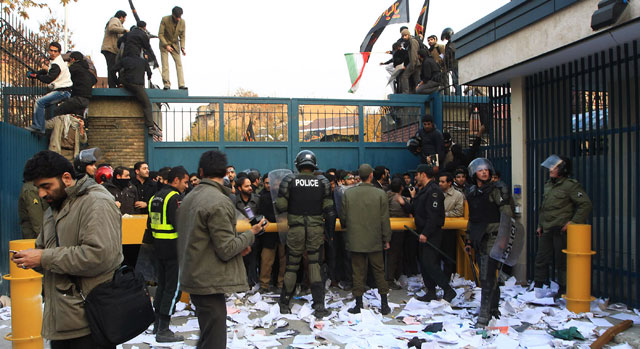Britain and Iran re-open embassies in London and Tehran
Foreign secretary Philip Hammond will hoist Union flag in embassy compound, four years after incursion

A free daily email with the biggest news stories of the day – and the best features from TheWeek.com
You are now subscribed
Your newsletter sign-up was successful
The British embassy in Tehran and the Iranian embassy in London will both re-open this weekend, four years after Iranian protesters stormed the Britain compound and diplomatic relations between the two nations were reduced to a minimum.
Britain's embassy will be re-opened by Philip Hammond, as he becomes only the second foreign secretary to visit Iran since the 1979 revolution – and the first to do so for 12 years – says the Daily Telegraph.
The embassy in Tehran has been under de facto Iranian control since angry students burst in and stole computers and hard drives in November 2011. The decision to re-open was made a year ago but technical wrangles have delayed things.
The Week
Escape your echo chamber. Get the facts behind the news, plus analysis from multiple perspectives.

Sign up for The Week's Free Newsletters
From our morning news briefing to a weekly Good News Newsletter, get the best of The Week delivered directly to your inbox.
From our morning news briefing to a weekly Good News Newsletter, get the best of The Week delivered directly to your inbox.
Iran was reluctant to relax import weight restrictions which made it difficult for the UK to bring in communications equipment to replace that which was stolen during the 2011 attack.
Hammond will raise a new Union flag this weekend – the BBC reported in 2011 that the protesters had burnt the original. The failure of the Iranian authorities to prevent the incursion angered Britain and led to the embassy's closure.
While the embassies both closed, some sort of diplomatic relations were maintained throughout: Britain has a non-resident charge d'affaires for Iran, Ajay Sharma. Sharma is to move to Tehran now and become ambassador.
Writing in The Guardian, Lindsay Hilsum says the re-opening is "something for both Iranians and British to celebrate", even if the UK has lagged behind other western nations in normalising relations with reformist president Hassan Rouhani.
A free daily email with the biggest news stories of the day – and the best features from TheWeek.com
Hammond will be accompanied by a trade delegation and Hilsum says the way may seem "clear" for business links – but Iranians do not "discard history so easily". If the UK would admit it helped depose the nationalist leader Muhammad Mossadegh in 1953, and apologise, that would really help mend the relationship, says Hilsum.
-
 What to know before filing your own taxes for the first time
What to know before filing your own taxes for the first timethe explainer Tackle this financial milestone with confidence
-
 The biggest box office flops of the 21st century
The biggest box office flops of the 21st centuryin depth Unnecessary remakes and turgid, expensive CGI-fests highlight this list of these most notorious box-office losers
-
 The 10 most infamous abductions in modern history
The 10 most infamous abductions in modern historyin depth The taking of Savannah Guthrie’s mother, Nancy, is the latest in a long string of high-profile kidnappings
-
 Epstein files topple law CEO, roil UK government
Epstein files topple law CEO, roil UK governmentSpeed Read Peter Mandelson, Britain’s former ambassador to the US, is caught up in the scandal
-
 Iran and US prepare to meet after skirmishes
Iran and US prepare to meet after skirmishesSpeed Read The incident comes amid heightened tensions in the Middle East
-
 Which way will Trump go on Iran?
Which way will Trump go on Iran?Today’s Big Question Diplomatic talks set to be held in Turkey on Friday, but failure to reach an agreement could have ‘terrible’ global ramifications
-
 Israel retrieves final hostage’s body from Gaza
Israel retrieves final hostage’s body from GazaSpeed Read The 24-year-old police officer was killed during the initial Hamas attack
-
 China’s Xi targets top general in growing purge
China’s Xi targets top general in growing purgeSpeed Read Zhang Youxia is being investigated over ‘grave violations’ of the law
-
 Panama and Canada are negotiating over a crucial copper mine
Panama and Canada are negotiating over a crucial copper mineIn the Spotlight Panama is set to make a final decision on the mine this summer
-
 Iran unleashes carnage on its own people
Iran unleashes carnage on its own peopleFeature Demonstrations began in late December as an economic protest
-
 How oil tankers have been weaponised
How oil tankers have been weaponisedThe Explainer The seizure of a Russian tanker in the Atlantic last week has drawn attention to the country’s clandestine shipping network